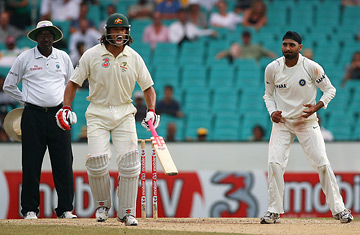
Australia's Andrew Symonds (centre) and Harbhajan Singh (right) of India during the Second Test match between Australia and India at the Sydney Cricket Ground. Umpire Steve Bucknor (left) has been suspended from the Third Test
Is this what people mean when they say sport is more than just a game? The second cricket test in the Indian team's tour of Australia ended with an Aussie victory on Sunday. But instead of being celebrated as a close and historic game — Australia equaled their own world record of 16 test wins in a row — the test seems destined to be remembered as one of the nastiest in cricketing history. The Indian team, frustrated at some appallingly bad umpiring decisions and Australia's unsportsmanlike behavior in benefiting from those decisions, are even more livid that one of their players has been banned for three games on charges of racism. The Australians accuse Indian bowler Harbhajan Singh of calling Andrew Symonds, the only non-white Australian player, a "monkey." Though the two on-field umpires did not hear the slur and though Singh vociferously denies he used the word, the match referee (who adjudicates in such disputes) said that he was "satisfied beyond a reasonable doubt that Harbhajan Singh directed that word at Andrew Symonds and also that he meant it to offend on the basis of Symonds' race or ethnic origin."
The Indian team has appealed the ban and suspended their tour until Singh's name has been cleared. On Tuesday the International Cricket Council (ICC) seemed to accede to another Indian demand by dropping umpire Steve Bucknor, who was blamed for some of the most controversial decisions. In a statement, the Board for Control of Cricket in India, which runs the game in its most lucrative market, says it wants the International Cricket Council "to review the decision of the match referee and suspend its operation till the appeal is disposed of ... The Indian board realizes the game of cricket is paramount but so, too, is the honor of the Indian team and for that matter every Indian. To vindicate its position the Board will fight the blatantly false and unfair slur on an Indian player." In India, protestors burned the umpires and the Australian captain Ricky Ponting in effigy and newspapers called for the team to come home early, describing the Australians as shameful and cheats. "It's not cricket, it's India versus a conspiracy," says Pankaj Kehra, 39, a manager at an import company in Delhi. "There's no need to play under these conditions of harassment."
At first glance, the brouhaha highlights some of the glaring differences between the two teams. Australia, cricket's most successful side, says it was only following rules when it reported Singh's racist remark. The Australians were appalled when Indian crowds made monkey noises at Symonds during a recent tour of India and senior Aussie players thought they had an agreement with the Indians that such behavior would not be tolerated on the field. But Indian commentators and former players argue that the word "monkey," even if it was used, is not offensive in India, where it is often used to mean "impish" or "mischievious" and where the monkey God Hanuman is a hero.
The Indians, in turn, accuse the Australians of double standards. In the rough-and-tumble world of international cricket, Australia has long been known as one of the toughest teams. Though they have tried to lose their bully boy tags over the past few years, Australian players still regularly "sledge" — or verbally niggle — their opponents. One former Australian captain called the practice "mental disintegration" and argued that it should be seen as an important part of the game. The Indian team — and players from other subcontinental teams such as Pakistan — complain that it's a bit rich for Australia to start moaning about on-field banter now. Indeed, India has lodged a counter complaint against an Australian bowler who they say called the Indians "bastards," a term Australians use to describe everyone from their worst enemy to their best friend, but which the Indian team manager told reporters "has a lot of bad meanings back in India and we are very sensitive about these issues."
But the differences between the two teams are perhaps not as striking as what they have in common. Both are confident and proud groups, a pride that in both cases can easily become self-righteousness. In India, a booming economy and the country's newfound self-confidence on the world stage is imbuing its traditional cricketing nationalism with a new streak of cockiness. The Australians, meantime, blindly believe they can do no wrong on the cricketing field, and are appalled that anyone would question their behavior or motives. When challenged, both teams put a wall up, even if there might be a legitimate question to answer. Sadly, such total loyalty is wrecking the game.
